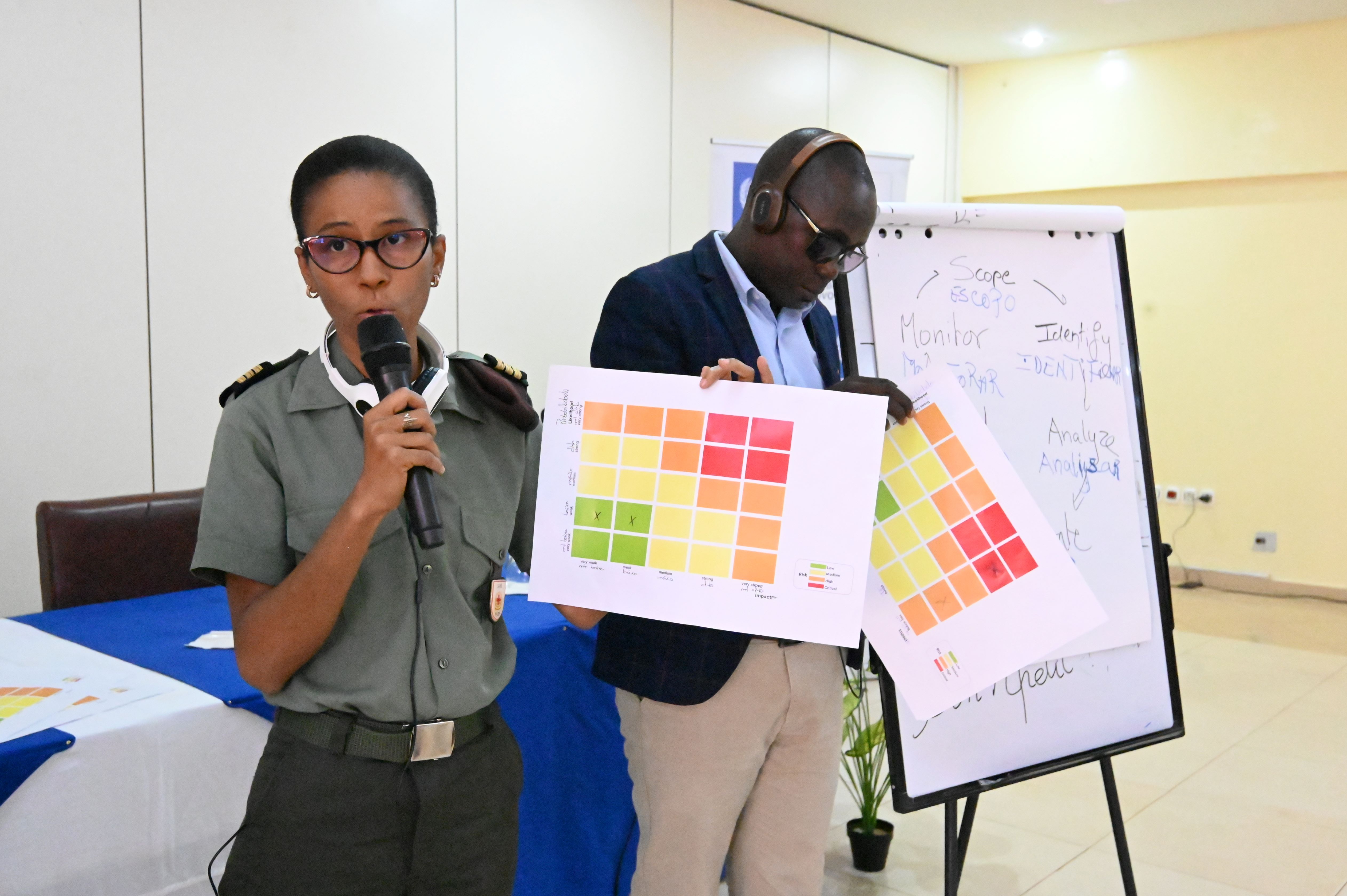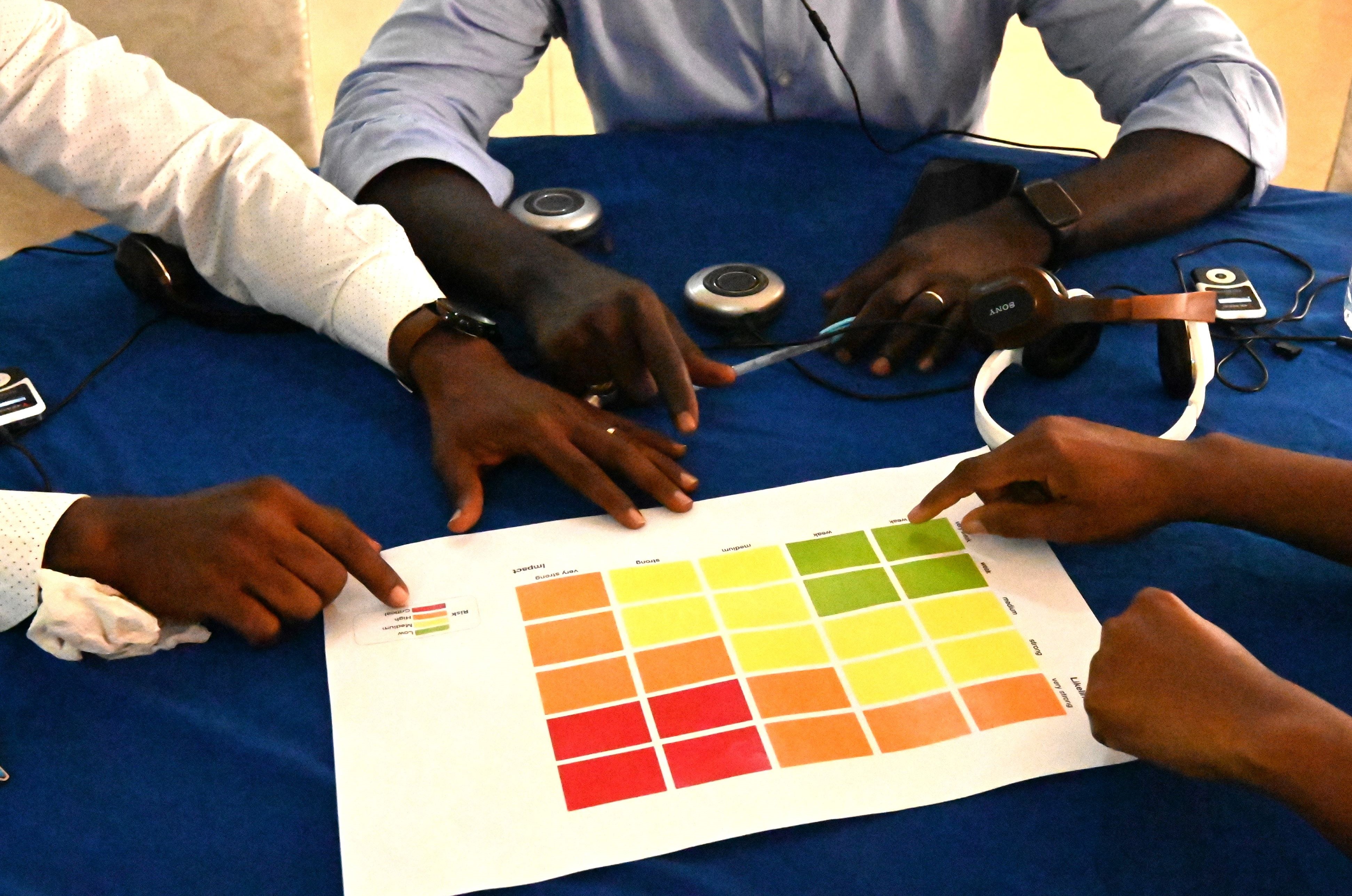Empowering Guinea-Bissau's Health Sector to prevent corruption
October 7, 2024

In a conference room in Bissau, the UNDP and the Health Governance International (HGI) jointly organized a three-day capacity building workshop on Corruption Risk Management in the Health Sector from 30 september to 2 october 2024. About 29 government officials mainly from the health sector participated in the workshop.
Mr. Carlos Dinis, Deputy Resident Representative of UNDP Guinea Bissau delivered the opening remarks for the workshop. He expressed his appreciation to UNDP and HGI for organizing such an important training. “I would like to thank our valued partners, whose support was essential in making this event a reality. Special thanks to the Government of Japan, whose financial support was fundamental to the implementation of this initiative.”
The training on Corruption Risk Management in the Health Sector marked a step forward of Guinea-Bissau's ongoing efforts to combat corruption and restore trust in public institutions. The workshop’s agenda extended beyond theoretical knowledge, involving extensive breakout group exercises where participants were introduced the step-by-step approach to manage corruption risks with practical exercises within the context of Guinea-Bissau. The trainers were experts from the Health Governance International (HGI).

For many participants, like Sabina Gomes, a senior official at the ministry of transport and telecommunications, the topic was not new, but the approach was groundbreaking. "Corruption has always been like an invisible shadow in our government," Sabina reflected. " This training will allow us to be able to identify acts that are not in line with the organisation's procedures and thus generally be able to prevent acts of corruption before they happen."
Over the past decade, more emphasis has been placed on preventative approaches with a stronger focus on systematic and targeted reforms and interventions to reduce system and organizational vulnerabilities. Global anti-corruption efforts have been evolving towards preventing corruption at the sectoral level through institutional interventions and multi-stakeholder collaboration.
The workshop was designed to build the capacity of public sector stakeholders by introducing them to modern methodologies of corruption risk management. The attendees were introduced to a step-by-step approach to identifying and mitigating corruption risks, specifically tailored to the context of Guinea-Bissau's health sector.
The participants broke into small groups to learn how to determine the risk level. Domingos Mussa Barbosa, administrator of the Regional Hospital in Bissorã, Oio Region, shared his insights: "I had always thought of corruption as something that happens far away from my work—something too big for me to change. But during this exercise, I realized how close it really is and that we all have a role in preventing it. Now, I know that I will be able to apply the mechanisms learnt here at a regional level."
The impact of corruption on health is evident. It undermines the functioning of the health system in so many ways as it diverts resources, causes negative health outcomes, threatens lives, and erodes trust in institutions. Corruption leads to a waste of financial and non-financial resources and exacerbates health inequities. The UHC Declaration of the United Nations General Assembly stated that “fighting corruption at all levels and in all its forms is a priority and that corruption is a serious barrier to effective resource mobilization and allocation and diverts resources away from activities that are vital for poverty eradication and sustainable development, which may undermine efforts to achieve universal health coverage”. Consequently, health is considered one of the top priority sectors for preventing corruption. Global efforts have been growing to address corruption in the health sector. The World Health Organization (WHO) took the lead in launching the Global Network for Anticorruption, Transparency, and Accountability in Health (GNACTA). Established in 2019, the GNACTA is a multi-stakeholder and multi-sectoral initiative that forges strategic alliances, drives thought leadership, builds capacity and implements solutions targeting corruption in the health sector to foster health systems strengthening.

The UNDP project “Promoting Transparency and Accountability in Governance to Prevent Corruption and Build Peace” started in November 2022 with funding from the Government of Japan to support Guinea-Bissau in its fight against corruption. This project aims at supporting and resourcing the implementation of the National Anti-Corruption Strategy of the Republic of Guinea-Bissau by enhancing the capacities of State and non-State actors, including CSOs, to combat and prevent corruption. The health sector has been selected by the Government of GNB and the Project as a priority sector.
This story is just the beginning of Guinea-Bissau’s journey toward a more transparent, accountable, and efficient health sector.
About Health Governance International (HGI): HGI is an international body specialising in improving governance, accountability and the fight against corruption in health sectors around the world.
About UNDP: UNDP is the leading United Nations organisation in the fight to end the injustice of poverty, inequality and climate change. Working with our wide network of experts and partners in 170 countries, we help nations develop integrated and lasting solutions for people and the planet. Find out more at www.undp.org or follow us at @UNDP

For many, the real impact of the workshop went beyond technical skills—it was about building a network of allies. "What we learned here will stay with us," said Capitan Sayonara, a nurse of the Military Hospital. "But more importantly, we’ve formed a community. we are all in this together now. We will fight corruption, not as isolated individuals, but as a group of agents of change.

 Locations
Locations



